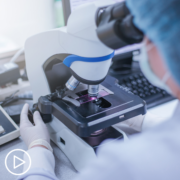Expert Advice for Patients With Small Cell Lung Cancer
Expert Advice for Patients With Small Cell Lung Cancer from Patient Empowerment Network on Vimeo.
Dr. Triparna Sen, a leading small cell lung cancer (SCLC) researcher and expert, shares key advice for patients. Dr. Sen stresses the importance of working closely with your doctor, asking about clinical trials options, and the benefits of support groups.
Dr. Triparna Sen is an associate professor in the department of oncological sciences and co-director of the Lung Cancer PDX Platform at the Icahn School of Medicine at Mount Sinai in New York. Learn more about Dr. Sen.
See More from Thrive Small Cell Lung Cancer
Related Resources:

|

Advances in Small Cell Lung Cancer Research | Hope for the Future |

|
Transcript:
Katherine:
What three key pieces of advice would you have for a patient who has just been diagnosed with small cell lung cancer?
Dr. Sen:
First of all, I would like to say definitely, definitely work with your physician. They are trying to do their best for you. Work with your physician. Follow the treatment regimen that they give. Ask about clinical trials that you are eligible for and that you can enroll into. Then, of course, having a support group. So, there are many patient advocacy groups right now for non-small cell and small cell lung cancer.
I think being a part of such a patient advocacy group where you have people going through the same journey, I think, it really helps. It helps you sort of manage your disease better. It helps you stay hopeful when you hear about other people’s sort of prognosis and if they have durable benefits from drugs. So, I think having a support group is very important. If there is an ability for you to contribute to research in terms of giving blood or tissues, if your physician is saying that you could be eligible for that, I think a contribution to research is really key.
Because looking at the disease mechanisms in the clinical tissue is sort of where for us it is absolutely golden. We go there. We look at the disease mechanisms and tissues. If there is an opportunity for you, then I think it should definitely be explored.
Finally, I would like to say we are really trying as researchers to really understand the disease better. We’re trying to do that better. I hope and I pray that we go faster with it. But I think there is hope right now for patients with small cell lung cancer. The research is really progressing better. There are many clinical trials.
So, I think stay hopeful and have a peer support group who can take you through this quite difficult journey.
Katherine:
Why should patients consider consulting with a lung cancer specialist?
Dr. Sen:
I think it’s crucial because these lung cancer specialists really know the current state of the art treatments. They are thought leaders. They participate in trials. They actually sit on advisory boards with companies.
They are strategizing the entire treatment landscape for this disease. So, if you go to a lung cancer specialist, you’re more likely to get the most updated knowledge about what treatments are out there, what you qualify for, what are the clinical trials out there, and what are working in patients. This is not just for small cell. There are many, many trials that are happening in non-small cell also. So, whatever your diagnosis is, a specialist should be able to tell you what your options are. You really want to know about your options. Your options about biomarker testing.
Your options about screening. Your options about trials. I think a lung cancer specialist can really guide you towards that.
Katherine:
Dr. Sen, thank you so much for joining us today. It’s been a pleasure speaking with you.
Dr. Sen:
Thank you.




